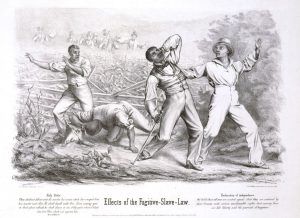Sean Wilentz in The New York Times:
 The Civil War began over one basic issue: Was slavery, the ownership of human beings, a legitimate national institution, fixed in national law by the United States Constitution? One half of the country said it was, the other said it was not. The ensuing conflict was the chief instigator of Southern secession, as the secessionists themselves proclaimed. It was thus the chief source of the war that led to slavery’s abolition in the United States. The struggle over property in slaves focused largely on the fate of the Western territories, but it also inflamed conflicts over the status of fugitive slaves. Pro-slavery Southerners insisted that the federal government was obliged to capture slaves who had escaped to free states and return them to their masters, and thus vindicate the masters’ absolute property rights in humans. Antislavery Northerners, denying that obligation and those supposed rights, saw the fugitives as heroic refugees from bondage, and resisted federal interference fiercely and sometimes violently. Even more than the fights over the territories, Andrew Delbanco asserts in “The War Before the War,” the “dispute over fugitive slaves … launched the final acceleration of sectional estrangement.”
The Civil War began over one basic issue: Was slavery, the ownership of human beings, a legitimate national institution, fixed in national law by the United States Constitution? One half of the country said it was, the other said it was not. The ensuing conflict was the chief instigator of Southern secession, as the secessionists themselves proclaimed. It was thus the chief source of the war that led to slavery’s abolition in the United States. The struggle over property in slaves focused largely on the fate of the Western territories, but it also inflamed conflicts over the status of fugitive slaves. Pro-slavery Southerners insisted that the federal government was obliged to capture slaves who had escaped to free states and return them to their masters, and thus vindicate the masters’ absolute property rights in humans. Antislavery Northerners, denying that obligation and those supposed rights, saw the fugitives as heroic refugees from bondage, and resisted federal interference fiercely and sometimes violently. Even more than the fights over the territories, Andrew Delbanco asserts in “The War Before the War,” the “dispute over fugitive slaves … launched the final acceleration of sectional estrangement.”
Delbanco, an eminent and prolific scholar of American literature, is well suited to recounting this history, and not just because fugitive slaves have been a subject of American fiction from Harriet Beecher Stowe to Toni Morrison and beyond. A traditional critic in the historicist mode, Delbanco has always thoughtfully rendered the contexts in which his writers wrote. He has offered fresh interpretations not only of how national politics shaped the writing of, say, “Moby-Dick,” but also of what Melville’s tragic awareness and moral ambiguities tell us about the temper of a nation hurtling toward civil war. Whitman, Emerson, Thoreau and Hawthorne, as well as Melville, Stowe and numerous lesser artists and thinkers of the time, all had pertinent if sometimes cursory and not always pleasing things to say about fugitive slaves. Delbanco’s incisive analyses of their observations — and, just as important, of their failure to observe — form one of his book’s running themes.
More here.
